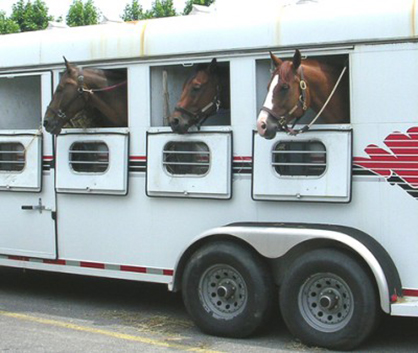Travel Tips For a Happy and Healthy Horse
 SmartPak offers tips to help you and your horse get safely to and from your destination
SmartPak offers tips to help you and your horse get safely to and from your destination
When you’re traveling with your horse, there’s more to do than simply hitch up the trailer and hit the road. SmartPak has the top tips you need for you and your horse’s best road trip ever.
“With a little bit of planning, preparation, and maybe practice,” said Dr. Lydia Gray, SmartPak’s Staff Veterinarian and Medical Director, “you can get your horse from Point A to Point B with confidence.”
Whether heading to a show or moving your horse to another barn, traveling with your horse comes with a variety of challenges so it’s important to be prepared. SmartPak is here with the helpful tips you need for a successful road trip with your horse to make it to your destination safe and sound.
Tip #1: Plan Your Route (And Your Breaks) Ahead of Time – Even if you’re planning to use your GPS while on the road, map out your route ahead of time to familiarize yourself with the major roadways you’ll be taking. Try to stick to a route that includes interstates and other main roads as much as possible to ensure a smooth ride for your horse. As SmartPaker Viviane learned on her most recent trip, “It’s important to consider traffic, bridges, major cities, mountains, parkways, and other streets that have restrictions on the height and weight of vehicles. For example, Google Maps would have sent me through New York City, which I wanted to avoid at all costs.”
During a long-distance trip, you’ll want to check on your horse and offer them water every four hours, so plan for any rest stops you’ll be taking along the way. To help with this planning, consider how far you’re able to travel with the trailer on one tank of gas. For any trip longer than 12 hours, it’s recommended to consider overnight stops, which in turn can add another layer of complexity to your planning.
Tip #2: Know What Documentation You Need – Whether you’re taking a short trip or a long-distance trip, your next step is to consider the health paperwork that your horse needs to travel with. Depending on your reason for travel and your destination, you may need the same kind of documentation for intrastate travel that is required for interstate travel. This paperwork can include health certificates and a copy of your horse’s negative Coggins test. Be sure to check with your veterinarian and the destination State Department of Agriculture website for the most up-to-date information.
Tip #3: Practice Makes Perfect – If it’s been a while since your horse has been on a trailer, or he’s never been on a trailer before, spend some time before your trip ensuring that he is comfortable loading, unloading, and even riding on the trailer. It’s also important to make sure your horse is comfortable with any protective gear, such as leg wraps, shipping boots, and halter fleeces, that you’re planning to use during the trip.
Tip #4: Keep Your Trailer in Tip-Top Shape – To keep your trailer in good working order and get ahead of any potential issues, create a regular maintenance plan and stick to it. Your trailer should be serviced once or twice a year to check the tires, brakes, breakaway battery, flooring, and frame. You should also stick to a pre-trip and post-trip checklist in between regular maintenance.
Tip #5: Know the Hidden Health Risks of Travel – When you are traveling with your horse, there are more risks to watch out for than what’s on the road in front of you. As you prepare for your trip, you should be aware of a few areas of your horse’s health that traveling can put at risk – Digestive and Gastric Health.
A number of factors can increase your horse’s risk for colic commonly occurring with travel. These factors include sudden changes in activity level, lack of turnout or increased stall time, changes in hay, changes in grain, and dehydration. Fortunately, there are ways you can help your horse cope with these common stresses. Along with management strategies, daily support from a digestive supplement, like SmartDigest® Ultra, may help support a healthy and balanced hindgut.
Several of the factors that can impact your horse’s digestive health can also impact your horse’s gastric health, including limited grazing, increased stall time, and a change in routine. Whether you’re at home or traveling – it’s a smart choice to provide your horse with a daily gastric health supplement like SmartGut® Ultra, even if he has a normal, healthy stomach right now. These formulas provide ingredients to help neutralize excess stomach acid and support gastric tissue health so that your horse always has what he needs to maintain his stomach health.
To learn more about these tips and to check out the rest of SmartPak’s tips, visit www.SmartPak.com/TravelTips, and don’t forget that you can get all the gear that you don’t want to leave home without at SmartPak.com.










